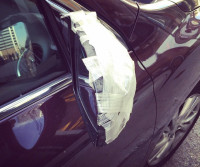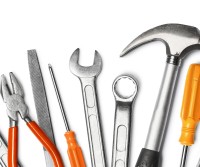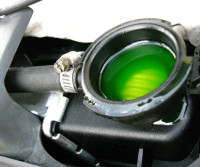
Perhaps you may have thought of resorting to do-it-yourself (DIY) techniques to repair your car, possibly as a way of saving costs incurred for every visit to the repair shop and as a personal challenge to improve your skills in car repair. While DIY techniques may prove to be both useful and enriching, they’re not always applicable to all aspects of car repair. Unless you’re a car technician yourself, you may not have all the time in the world to study all the ins and outs of car repair, which is why some complicated repair matters may not be covered by your DIY skills. To avoid the risk of aggravating your car’s condition, here are some car repair problems that shouldn’t be addressed with DIY techniques.
1: Replacing your worn-out timing belt
Once your car racks up more than 50,000 miles, you may want to have your timing belt checked. Being one of the more crucial wear-and-tear replacements, your engine’s timing belt has to be replaced once it breaks down because your car wouldn’t run properly after that. One thing that has to be considered about your timing belt is that it’s almost always one of the most expensive to repair. With components ranging between $450 and $1,000, you might as well repair your car’s timing belt all by yourself. However, a DIY approach to repairing timing belts is utterly inadvisable.
Several car owners have reported subjecting their cars to more expensive repairs after attempting to fix their timing belts by themselves. With engine damage being the inevitable result of failed DIY approaches to repairing timing belts, it is highly recommended that you don’t deal with your car’s timing belt by yourself. Ask for the services of a skilled car technician for having your timing belt problem addressed – paying between $450 and $1,000 for components plus service charges is definitely more bearable than subjecting your engine to at least $3,500 worth of repairs due to damage caused by DIY approaches.
2: Addressing your automatic transmission problems
If you own an automatic-transmission car, it’s best for you to have your car checked by a car technician one it encounter problems related to its automatic transmission system. Containing several minute components, your car’s automatic transmission system can be very difficult to manage through DIY approaches. Arteries for hydraulic fluid passage and precisely-fitted parts all make up automatic transmissions they can be very complicated to address on your own and it can subject you to very costly consequences once you make a mistake. Therefore, a car technician would best solve your car’s automatic transmission issues, given that they specialize in dealing with its ins and outs.
Your car’s automatic transmission system would most likely lead you to more repair costs if you deal with it improperly using DIY approaches. More often than not, maintaining your car’s automatic transmission system on your own may inadvertently lead to more damage owing to its sheer sensitivity. Thus, even seeming-simple maintenance procedures such as fluid change and flushing should be left to the care of specialized car technicians – their expert services ensures you of less costs and greater success, relieving you from the possibility of exposing yourself to greater costs by going DIY.
3: Dealing with overheating
Overheating is every car owner’s bane, not least because it emerges as a symptom of their car’s overuse. Dealing with the root cause of overheating through DIY approaches is a big no-no unless you’ve received ample training for dealing with cooling systems. Be that as it may, the fact that cooling systems repair is among the most advanced repair issues in cars leaves you with the services of a skilled car technician as the most cost-effective choice for resolving overheating. Otherwise, your DIY attempts to fix your car’s overheating problem would only lead you to suffer massive financial consequences.
4: Dabbling with the cause of your car’s faulty drivability
At some point, your car will definitely start exhibiting problems relating to drivability – failure to start properly, stalling and surging, and notifications telling you to check your engine are just some of the examples involved. Needless to say, those are the kinds of problems that can’t simply be solved by DIY techniques – they require a specialized form of training even skilled car technicians have struggled to perfect. With that, drivability problems shouldn’t be part of your DIY coverage – they are best left to the care of repair shops where car technicians have ample experience dealing with those issues.
Another thing most DIY connoisseurs have failed to understand is the fact that drivability problems require several pages of diagnostics to understand and resolve. Those diagnostics typically require further tests as well, given that codes pertaining to damage in drivability tend to involve other components as well. It is in that regard where DIY approaches have failed to address faulty drivability – just because the diagnostics mention specific codes doesn’t exactly mean that the problem is exclusive to the components mentioned. For that, your car’s drivability problems must undergo a series of repair sessions conducted by car technicians – that’s way more convenient and practical than solving the problem on your own and causing further damage in the process.
5: Solving your suspension woes
Your car’s suspension system may look very easy to deal with from the onset, but the reality is that it’s very difficult to deal with its complexities without proper training. That alone should serve as a warning against employing DIY techniques on solving suspension problems. There have been many instances already where DIY attempts to fix suspension have failed miserably, starting with the failure to deal with the massive force involved in putting a compressed coil spring in place. Replacing struts, arms, and bushings also require the specialized skills of car technicians, given the sophisticated order of their arrangement within your car’s suspension system. Considering as well that service charges aren’t too high as to merit amateur DIY approaches, having your car’s suspension system fixed by car technicians is undoubtedly a more cost-effective idea.
Any of our Fast Lube Plus Locations are more than happy to take the reigns to handle these issues. Give us a call to schedule now!

“A man is only as good as his tools.”
Here at Fast Lube Plus we firmly believe that preventative maintenance is the key to keeping your vehicle running at peak performance, but we also are realistic in the fact that sometimes things beyond our control can occur, possibly putting you in a position where a quick fix is necessary. The purpose of this post is to help put together a list of some very useful tools to have around should you ever find yourself stranded.
Having access to a few essential tools can mean the difference between towing to a shop or continuing down the road on your own accord. It should be noted that you should only ever work within your comfort level when having to fix your car in a pinch. So if you are comfortable enough to take the reigns in a pinch, here are a few good suggestions to keep tucked away in your vehicle for the occasion.
- Flashlight – This is perhaps the most essential piece of equipment to keep in your vehicle at all times whether you plan on working on it yourself or not. Always keep a flashlight handy, and test regularly to make sure the batteries are charged.
- Jack / Lug Wrench – Your spare tire is useless without these 2 pieces of equipment. Make sure you know the jackpoints on your vehicle, and a handy trick is to loosen the lugs (in a star pattern) while the tire is still touching the ground.
- Screwdrivers – You cannot do any repair without screwdrivers. It would be wise to keep a couple of these tools with different head shapes and sizes. They are necessary in loosening and tightening the different screws in different parts of your car.
- Vise-Grip Pliers – These lockable pliers are worth their weight in gold. They are most useful as a locking wrench to help loosen / tighten tough bolts or nuts.
- Adjustable Wrench – This handy tool adjusts to fit many sizes of bolts and nuts, and with your Vise-Grip Pliers can help tighten free spinning nuts and bolts.
- Tire Gauge – Used to check the pressure of your tires (including your spare), this should be used monthly to keep tire pressure maintained at the correct levels to prevent unnecessary flats.
Feel free to consult with your Fast Lube Plus technician on your next visit for a demonstration of how to use each of these!

Besides your brake pads, fluids are the majority of the most important maintenance to your vehicle to keep on the road for several hundred thousand miles. Friction and heat are enormous by-products of the power your vehicle creates to shuttle us around, and without these fluids your vehicle will simply not work. Keeping these fluids fresh and full can make the difference between simple maintenance and costly repairs.
Which fluids should you check? Here are five of your engine’s fluids you should make a habit of checking:
ENGINE OIL
- Check your oil once a month.
- Check out your owner’s manual to know when to have the oil replaced. Timeframes depend on the car.
- Typical numbers are every 3,000 miles for newer engines up to 7,000 miles for high mileage. Higher mileage engines can go longer due to the parts being “worn in”, causing less friction meaning less lubrication is necessary.
TRANSMISSION FLUID
- Transmission fluid should be checked monthly.
- It should be replaced every 50,000 to 100,000 miles.
- This is a job for FastLube Plus or another professional, as many times gaskets must be replaced as well.
COOLANT
- Coolant should be checked twice yearly, before summer and before winter.
- It needs to be replaced every 2 to 3 years.
- Low coolant can lead to blown radiators when air (which can expand) enters the cooling system.
BRAKE FLUID
- You should check this once a month.
- Brake fluid needs to be replaced every 2 years.
POWER STEERING FLUID
- This fluid should be checked once a month.
- Check your owner’s manual for information of replacing power steering fluid. It greatly depends on the car.
The team at FastLube Plus is always happy to answer any of your questions. We can also check your engine’s fluids and replace any necessary fluids. A well-maintained car is synonymous with safe car. To schedule an appointment please call us at919.387.9996 to find your nearest FastLube Plus location.
